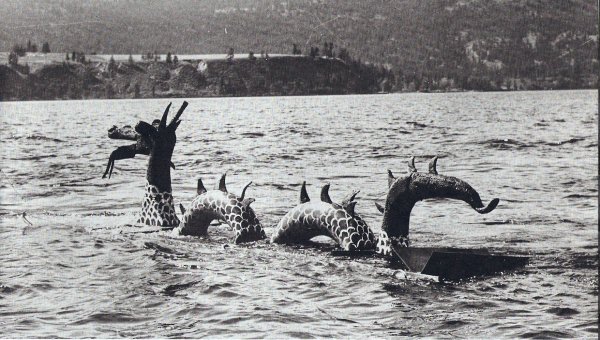
Ogopogo, known to the Natives as N'Haatik, the Demon of the Lake. Legends were handed down from father to son about the monster whose home was between Squally Point and the Island. He had to be appeased or he would churn the waters in fury. Sometimes a dog was sacrificed to keep in his good graces.
The Daily Province - 1926
Devices designed to repel the attacks of Mr. Ogopogo and family will be installed aboard the modern ferry to be operated by the Government from Kelowna, it was reported today at the Parliament Buildings.

The name Ogopogo evolved from a popular music hall song:
I'm looking for the Ogopogo, the funny little Ogopogo.
His Mother was an Earwig and his Father was a whale.
I'm going to put a little bit of salt on his tail.

Simpson´s was one of the more progressive mills with a private reforestation program.
 Kelowna Oil Wells
Kelowna Oil Wells
June 1931
Production nears at Kelowna Oil Well No.1. Increasing presence of gas in the bore indicates the approach to horizon of petroleum.
April 1932
Work was resumed on the Kelowna Oil Well. Money has been forthcoming to carry on drilling to a depth of 3,000 feet.
....But it never did produce.

In 1939, Kelowna like the rest of the world woke up to the Second World War. Again the men (and later many women) went off to fight and the folks at home tried to cope with the orchards and the work of pruning, spraying, irrigating and harvesting that still had to be done.
But this, too, passed, and in time the boys' and girls' came home.
The government of British Columbia had given considerable thought to the resettlement of the returning veterans.
One of the members of the Resettlement Committee was the man destined to be B.C.'s outstanding Premier, W.A.C. Bennett.
Lands and homes were made available to the veterans, many of whom returned with a whole new outlook, having seen the world outside.

Major General Rodney F.L. Keller - C.B.E., Croix de Guerre Permanent force commission in the P.P.C.L.I. and Commander in Chief of the Second Canadian Division overseas/WW2.
Born in Tetbury, England in 1900, son of Dr. and Mrs. Herman Keller (Dr. Keller was the second physician to arrive in Kelowna).
General Keller served as a Kelowna alderman following WW2, and was Honorary Colonel of the B.C. Dragoons until his death in 1953.
